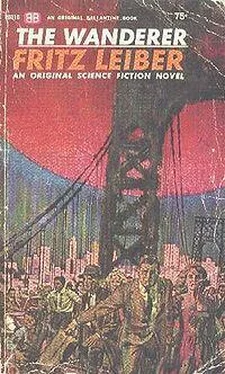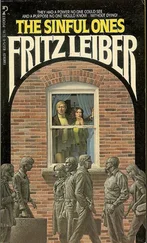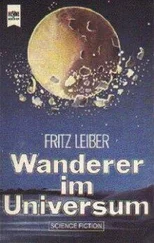The tree rose from a slight mound half covered by the exposed section of its own thick gray roots, on which the mud-spattered Rolls now was parked.
South of the mound stretched a tiny graveyard, its wooden headboards sand-drifted and some pushed down and all sedge-draped by the scour of the last high tide. At the foot of the graveyard was a small wooden church that had once been painted white. It was shifted a dozen feet off its foundation bricks and strained and twisted at the corners, though not broken apart. The brown mark of the tide went up about eight feet on it, almost to the flaking but newer-painted black letters over the door, which read CHURCH OF JESUS SAVER .
Barbara squeezed her eyes shut several times rapidly. It looked to her as if several patches of the blue sky had come down onto the flat, brown-green land to the east, a little like the watery reflections one sees far ahead on a level concrete road on a burning hot day. The blue patches grew and merged. No longer conscious of blinking, Barbara watched with an intensity approaching that of trance. Second linked to second and minute to minute seamlessly, as if the hooves of time had halted, or as if something in her stood still so that she could no longer hear their pounding.
Nor — so attentive was she to the strange phenomenon of the sky overflooding the land — did she much hear the physical roar coming louder and louder from the east, or the awed, excited calling back and forth of the three great gray featherless fowl beneath her, or even much feel the tree shake and strain as the waters came surging around it, or hear Helen’s scream.
But it did seem to her that the whole earth was tipping and sliding up into the sky as that blue came reaching dizzyingly underneath, and she leaned farther and farther backwards and would have fallen, except that now a body came pressing up against her side and a strong arm came around her back, bracing her.
“You hold on, Miss Barbara,” Benjy was shouting in her ear. “You watch so hard you fall.”
She looked around the watery plain. Florida was gone. The Church of Jesus Saver was floating off upside down with its eight short legs crookedly in the air.
She looked down again. The magnolia, its height halved, was a lonely midsea refuge. She thought of the Rolls Royce and giggled.
“I don’t know about that, Miss Barbara,” Benjy said, diviningly. “I hoist out the battery and ’stributor and some more parts. Grease others heavy — might help. Plug up gas tank tight at both ends, same for oil. Tide go down, she might run again, though I be surprise.”
The tree swayed with the surge and then swayed back. Helen squawked. Hester clutched at her. Benjy laughed crowingly. He said to Barbara: “But I still got hopes — some.”
Ross Hunter, driving conservatively fast, swung the sedan around the last curve. Now the road lay straight along the high mesh fence of Vandenberg Three.
Margo hit his shoulder and pointed at a small open door in the first corner of the fence.
Hunter didn’t slow down. “No good,” he grunted. “I’d try for a gate that can take the car.”
“Hurry it up,” Hixon urged from the back seat.
The landscape turned suddenly spectral. The big cloud-bank had cut off the sun. There was thunder. Through the thunder, guns cracked ahead. A police car came out of the flaming laager through the opening clipped in the freeway fence, plunged down a little slope, and headed in their direction, bumping and jouncing around the edge of the burned car-crush at the mouth of Monica Mountainway. A second police car came out, hind end foremost but backing fast, and followed the first.
Hunter slowed. There was a big gate with an empty guard booth. The gate was open. He swung through it as a third police car, this one front end first, escaped from the laager.
Hunter gunned the sedan across the dusty gray gravel toward a wide black door in the biggest of the three white buildings.
Beyond them Margo saw teenagers climbing the far fence and crowding in through a little door in it.
Hunter pulled up. Hixon and Margo piled out. There were three concrete steps, a narrow porch, then the black double door with a tag of white on it.
Hixon and Margo ran up the steps. She tried the door. It was locked. Hixon pounded on it with the butt of his rifle and yelled: “Open up!”
Hunter started to turn the sedan around.
The first police car came screeching through the gate and headed toward them. Through the clouds of dust the first raised, the second police car followed, still backing.
Hixon ran to the nearest window and smashed with his rifle butt through it, then chopped away at the big fangs of glass left.
With a squeal of brakes, a surge of springs, and a ten-foot skid, the first police car drew up beside the sedan. Two officers jumped out, their faces soot-smeared, their eyes wild. One wave of a Tommy gun.
“Drop your guns, all of you!” he yelled.
The other covered Hunter. “Get out of that car!”
Hixon, holding his rifle muzzle away from the police, yelled: “Hey, we’re on your side!”
The officer let off a couple of shots that holed the stucco over Hixon’s head. He dropped the rifle.
Margo was holding the revolver behind her.
Hunter climbed out of the car and came up the steps, hands held shoulder high.
The backing police car drew up behind the first. More officers piled out of it. The third police car drew up outside the gate.
Something dropped through the sedan window and bounced on the seat. Something else smashed against the windshield of the first police car, and hissing flames jetted out in a blue-yellow burst.
The police fired around the side of the building from which the Molotov cocktails had come. Two or three unseen guns returned their fire.
Margo was looking at the white tag on the black door. She ripped it down and crumpled it up.
The driver of the first police car lunged out of it, face arm-shielded from the flames. There were flames inside the sedan, too.
Hunter, keeping his hands raised, came up to Margo and Hixon.
The Molotov cocktail that had fallen unbroken into the sedan exploded. Big, blue-yellow flame-jets flared from the four windows.
Hunter said: “Let’s run for it. The little gate we saw first.”
They did. The police didn’t shoot at them. The officers were already piling back into their second car. Thunder rumbled again, much louder.
Margo and Hunter and Hixon ran past the last white building just as a bunch of teenagers came around it on the other side. Margo felt the gust of their crazy high spirits like an electric wind, and for a moment she was on their side. Then gravel jumped ahead of Hunter, there was a crack, and she realized one of the kids was shooting. They were waving bottles and knives and one of them had a handgun. It was still more than fifty yards to the little gate.
The teenagers came at them whooping and screaming. A girl threw a bottle.
As she ran, Margo shot at them three times with the revolver and didn’t hit anyone. Making the third shot, she tripped and sprawled on the gravel. The thrown bottle hit beside her and broke. She threw up her hands to shield her face from the flames, but there was only the smell of whiskey.
Hunter yanked her up and they ran on. Ahead, Hixon was pointing at something and yelling.
The teenagers no longer came straight at them, but a dozen or so raced ahead toward the little door, cutting them off.
Margo and Hunter saw what Hixon was pointing at: a bright red car with a black hat at the wheel coming fast down Monica Mountainway, tires screeching at the turns.
The teenagers had them blocked off from the door but they still ran toward it.
Читать дальше










